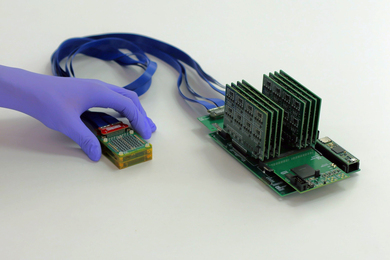CAMBRIDGE, Mass. -- Swiss-based pharmaceutical giant Novartis -- drawn like "a magnet" to Cambridge's confluence of brainpower, academic and medical institutions, biotech companies, and congenial political and economic policies -- is creating a world-wide drug discovery center on MIT commercial property in Technology Square.
"Why Cambridge?" asked Dr. Daniel Vasella, chairman and CEO of Novartis AG in a Monday news conference at the Massachusetts Institute of Technology. "Analysis shows that it is more and more difficult to attract and retain scientific talent, so we have to go where the talent is. Cambridge is a pool of scientific talent not found elsewhere in the world."
Novartis will invest $250 million in the center, which it will lease from MIT. The new building, at the junction of Main and Fulkerson Streets, is slated to open by July next year.
In welcoming Novartis to Massachusetts, "the biotechnology state," Sen. Edward Kennedy (D-Mass.), said, "Novartis' strong desire to be in Cambridge further strengthens Kendall Square as being the epicenter of the biotech world." He added, "The high quality of research here is the best in the world."
Cambridge is home to MIT, Harvard, the Whitehead Institute, the Whitehead Institute/MIT Center for Genome Research and 60 biotech and pharmaceutical companies. Fifty-two of the firms are located in the Central Square, Kendall Square and East Cambridge areas within a mile of the MIT campus. Across the Charles River are Boston's famed hospitals.
Novartis will organize its worldwide research activities under the umbrella of the Novartis Institute for Biomedical Research (NIBR). The new research facility at 100 Technology Square will encompass the building's entire 255,000 square feet of laboratory and office space, with room for 400 scientists and technology experts.
Eventually, under a 10-year expansion plan that also include space in adjacent buildings, 900 scientists will be based here.
"We at MIT are absolutely delighted that this great company has selected Technology Square" as a nucleus for future biomedical development, said MIT President Charles M. Vest, who hosted the news conference in the MIT President's House, now known as the Gray House in honor of former President Paul E. Gray and Priscilla K. Gray.
Cambridge Mayor Michael Sullivan said the two percent vacancy rate in biotech space allowed Cambridge to thrive despite its 27 percent vacancy rate in commercial space. "Not only are you providing jobs, you are providing life-saving drugs that will help our people," said Sullivan, noting Novartis makes drugs for diabetes, a disease that affects members of his family.
Novartis' research activities in Europe, the United States and Japan will be led out of Cambridge by its new head, Dr. Mark Fishman, who was introduced at the conference. He is currently chief of cardiology and director of cardiovascular research at Massachusetts General Hospital and professor of medicine at Harvard Medical School.
"Our establishment of NIBRI in Cambridge, in the midst of one of the world's most impressive pools of scientific talent and academic institutions, will help attract the best researchers and increase research productivity by capitalizing on the vast increase in therapeutic targets stemming from the sequencing of the human genome," Vasella said.
Among Novartis' drugs is Glivec/Gleevec, an FDA-approved leukemia drug. Basic research at MIT's Center for Cancer Research led to the experimental use of Glivec for some patients with Gastrointestinal Stromal Tumor (GIST), a rare and otherwise incurable cancer. Results so far have been promising.
One of the participants in the news conference was Norman Scherzer, head of the Life Raft Gastrointestinal Stromal Tumor (GIST) patient group, an Internet support group for GIST patients and their families. Scherzer lauded Vasella for developing a drug "for a very few patients." He said he expected his wife to die of the disease a year ago, but she took the drug and recovered. He introduced her to spontaneous applause.
Vasella said that science policy in the United States, particularly the $20 billion research budget of the National Institute of Health, was a key factor in the decision to locate their center in the United States. European investment in such research is only $1.8 billion, he said. The United States also has 30percent more Ph.D.s per capita than Europe. The various factors create "a magnet" for drug research in Cambridge, he said.
The Novartis "research campus" will focus on the discovery of new drugs for diabetes, cardiovascular and infectious diseases.
The Novartis building is in front of 200 Tech Square, the home of the MIT Lab for Computer Science and the Artificial Intelligence Lab. Technology Square was originally developed by MIT three decades ago. MIT sold it in 1973, bit last February, MIT purchased the property and the new buildings under construction there for $278.8 million. The property is in the investment portfolio of MIT, which is Cambridge's largest taxpayer at $15 million a year.
Novartis AG, a company formed in 1996 out of the merger of Sandoz AG and Ciba Geigy AG, produces pharmaceuticals, consumer health products, generic drugs, eye care and animal health products. Headquartered in Basel, Switzerland, Novartis Group companies employ about 72,600 people and operate in more than 140 countries.





